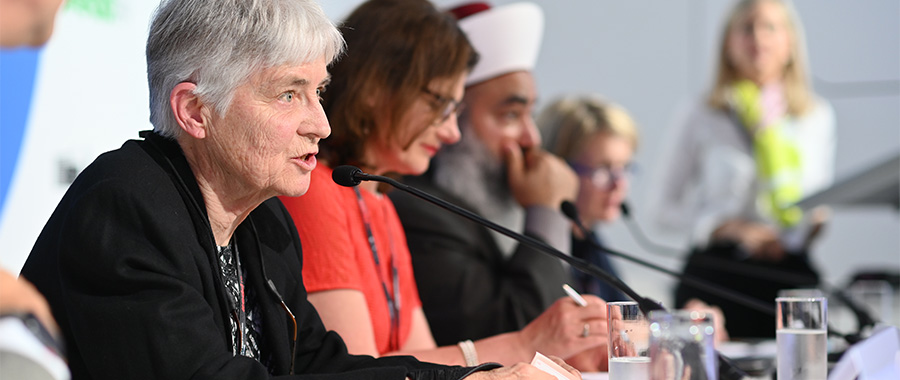In an increasingly complex global landscape, the intersection of spirituality and humanitarian efforts beckons deeper exploration and application. The Bahá’í teachings offer a profound framework for integrating religious insights into development work, aiming for a holistic approach that promotes not only material advancement but spiritual transformation. This article delves into various aspects of this integration, providing a comprehensive examination of how Bahá’í principles can enrich development initiatives.
1. The Concept of Oneness
At the core of Bahá’í teachings lies the principle of oneness—the idea that humanity constitutes a single family that transcends geographical, racial, and cultural boundaries. This notion fosters empathy and solidarity, essential elements in development work. By recognizing the interconnectedness of all human beings, development practitioners can create initiatives that respect diverse cultural backgrounds and promote collaborative efforts rather than divisive tactics. A united approach enhances community engagement and fosters ownership of development projects among local populations.
2. Spiritual Foundations of Development
Integrating spiritual principles into development necessitates an understanding of the inherent dignity and worth of each individual. Bahá’í teachings underscore the importance of cultivating spiritual virtues such as compassion, honesty, and selflessness. Incorporating these virtues into development processes—whether through participatory decision-making or community service—ensures that programs are not merely transactional interactions but transformative experiences. This spiritual dimension guides practitioners in addressing not only the physical needs of individuals but also their emotional and psychological well-being.
3. Education as a Catalyst
Education is paramount in Bahá’í philosophy, regarded as a vital catalyst for both individual and societal development. The Bahá’í approach emphasizes the empowerment of individuals through education that is not only academic but also character-building. This holistic educational paradigm equips individuals with skills to contribute meaningfully to their communities. In development initiatives, the incorporation of educational programs that embrace both material and spiritual knowledge encourages community resilience and promotes lifelong learning. It cultivates critical thinking and problem-solving abilities, essential for sustainable progress.
4. Equity and Gender Equality
Another pivotal area where Bahá’í teachings align with development is in the promotion of equity, particularly gender equality. The Bahá’í Faith advocates for the equality of women and men, asserting that society’s advancement hinges on the empowerment of women. Development programs that embrace this principle yield more effective outcomes. By ensuring equal access to resources, education, and participation in decision-making, development efforts can harness the diverse talents of all community members. Such inclusivity not only enriches the developmental agenda but also cultivates a sense of shared responsibility.
5. Consultative Processes
The Bahá’í practice of consultation serves as a fundamental mechanism for decision-making within communities. This process transcends traditional hierarchical structures and fosters a collaborative environment wherein all voices are valued. In development work, adopting a consultative approach enables a more democratic and inclusive process whereby communities actively participate in shaping initiatives that affect their lives. Facilitation of open dialogue encourages mutual respect and understanding, leading to solutions that are grounded in local realities and are thereby more likely to be effective.
6. Sustainable Development Goals Alignment
The alignment of Bahá’í principles with the United Nations’ Sustainable Development Goals (SDGs) further illustrates the Faith’s relevance in contemporary development discourse. The SDGs aim for a more equitable and sustainable world, echoing fundamental Bahá’í tenets of justice, unity, and collective well-being. Integrating Bahá’í teachings into SDG-oriented initiatives can provide a richer moral framework to address complex socio-economic challenges. This alignment encourages stakeholders to adopt an expansive view of development, intertwining spiritual and material progress in their efforts.
7. The Role of Community Development
Community development is a cornerstone of effective humanitarian work. Bahá’í teachings promote the idea of collective action driven by grassroots initiatives, empowering communities to identify and address their unique challenges. This localized approach not only enhances the relevance of development programs but also strengthens social cohesion. By fostering an environment where community members collectively devise solutions, development work becomes a manifestation of shared aspirations, fostering a sense of belonging and mutual support.
8. Moral and Ethical Responsibility
Finally, Bahá’í teachings imbue development work with a moral and ethical responsibility. Practitioners are called upon to conduct themselves with integrity, prioritizing the needs and welfare of individuals and communities over personal or organizational gain. This ethical compass ensures that initiatives are designed and implemented with consideration for their long-term impact, promoting sustainability and accountability. Importantly, this responsibility extends to the stewardship of the planet, resonating with the urgent need for environmental considerations in development initiatives.
In summation, the integration of Bahá’í insights into development work provides a multifaceted framework that fosters holistic and sustainable progress. By prioritizing principles of oneness, education, equity, consultation, and moral responsibility, development initiatives can transcend limitations and address not only the material needs but also the spiritual aspirations of individuals and communities. As the world navigates unprecedented challenges, the time for a paradigm shift that embraces spiritual insights in development is both timely and necessary, sculpting a future grounded in unity and shared purpose.
